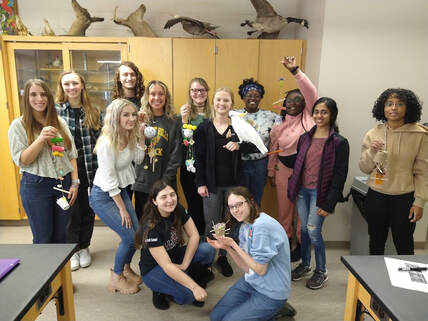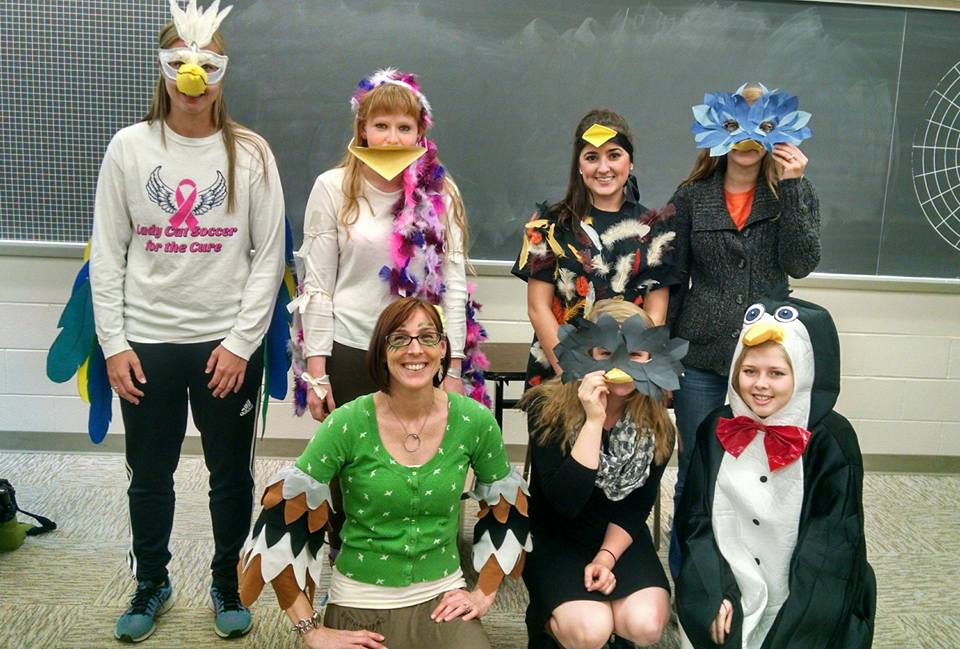Courses Taught
|

General Biology (BIOL 0110)
The overall goal of this course is to help students learn and retain relevant biological knowledge that they can apply to future coursework and employment. This course is also intended to lay the groundwork for students to make informed decisions about current biological issues. As citizens we are constantly bombarded by issues related to science and you may at times be forced to make decisions based on your biological knowledge. A further goal is to foster a continuing interest in the biological sciences. This course will focus primarily on the function of organisms at the molecular and cellular level, and will provide you with information to help you better understand how your own body works.
This course is the first of a two semester series that introduces students to the science of biology. It is intended for biology and related majors and also fulfills the General Education requirement for non-Natural Sciences majors.
Apocalypse How: The Struggle to Achieve Biological Sustainability in the Anthropocene (BIOL 0090)
This is a non-majors course, and does not apply towards the Biology major. However, many Bio students take it because they find the material relevant and interesting! This course focuses on the man-made crisis that is threatening humanity's ability to survive on the planet Earth, and what we can do about. It is a course that focuses heavily on reading and discussion. I cover climate change, mass extinction, disease, pollution, and development of antimicrobial resistance.
Animal Behavior (BIOL 1172)
Animals do many amazing, seemingly inexplicable things. The goal of this course is to learn why animals do the things they do, as well as which questions to ask when investigating animal behavior. Humans are animals too, and the concepts we cover in this class can also serve as tools for understanding human behavior. In this course we will examine how natural selection, learning and cultural transmission shape the natural behaviors of animals. We will seek to understand both the proximate mechanisms underlying behavior and ultimate evolutionary reasons for the existence of a behavior. Course material will be covered in both lectures and in discussions of research papers. The course is intended for undergraduate majors in Biology, Psychology, and Environmental Science.
Specific goals of the course include;
- Gain familiarity with basic terms and concepts in animal behavior
- Understand the basic ecological and evolutionary processes that shape animal behavior
- Understand the relevance of animal behavior
- Learn to use professional sources to gain information about animal behavior
- Increase effectiveness in your ability comprehend, write about and discuss scientific information
This class is speaking enhanced, and has several enhanced projects including leading a discussing, presenting a lecture and developing a youtube video. The first youtube videos were titled "Daddy Dearest" and can be viewed at the class youtube site: https://www.youtube.com/channel/UCG0KrTNEA5gfQQkTKGvQH8w
Animal Behavior Lab (BIOL 1272)
Animal behavior can be rich and fascinating, with as much capacity for intrigue, deception, and strategizing as any soap opera. The goal of this class is to explore and become familiar with some of the methods used to study and understand animals in the field and lab. We will conduct laboratory and field exercises to test hypotheses about the development, adaptive function, evolution and physiological control of behavior of vertebrates and invertebrates. In addition, students will troubleshoot a lab that they will present to the class, which will develop hypothesis development and experimental design abilities. Intellectual skills to be emphasized include the interpretation of graphs and other data, the critical evaluation of the primary literature (i.e. research papers), the formulation of testable hypotheses, simple statistical analyses and writing of scientific reports.
Photo depicts the "Animal enrichment" lab with Yoko the cockatoo.
Ornithology (BIOL 1175)
There are over 300 million species of birds and they can be found on every habitat on earth, including the coldest realms of the arctic to the hottest deserts. Birds have many characteristics that have long fascinated humans, including flight, fanciful plumage, and elaborate singing ability. This course will satisfy your curiosity about such an amazing group, and will cover a variety of topics including the evolution of birds, physiology, cognition, communication, social behavior, and life history characteristics, among others. Many avian species are now of conservation concern, and we will also discuss threats to birds and strategies for conservation. This course will provide a global perspective on birds. Students interested in field identification and birds of Pennsylvania should take the lab as well.
Ornithology Lab (BIOL 1275)
This lab serves as a hands-on introduction to one of the most diverse and fascinating group of vertebrates, with a focus on birds of PA. By handling specimens, skeletons and watching birds in the field you will become familiar with the physiology, habits and behavior of eastern birds. You will be responsible for learning the order and family of local species and be able to identify them by sight and/or sound. Several field trips are important (and awesome) components of the course and although they are not mandatory, they are difficult to make up.
Vertebrate Biology (BIOL 1170)
Much of our understanding and appreciation of the natural environment arises from knowledge of and interactions with vertebrates. The goal of this class is to expand our knowledge of vertebrates by learning:
1. The classes and major orders of the extant vertebrates
2. Evolutionary history and phylogenetic relationships between major groups of vertebrates
3. Morphological adaptations of vertebrates for feeding, locomotion and reproduction etc in aquatic and terrestrial environments
4. Physiological adaptations of vertebrates for homeostasis, reproduction etc
5. Behavioral adaptations of vertebrates
6. Human influences on vertebrate diversity and survival.
Wildlife Management (BIOL 1171)
The intent of this course is to introduce students to principles of wildlife management and conservation biology, and prepare students for positions in wildlife professions. We discuss ethical and philosophical aspects of wildlife management as well as techniques for understanding and managing wildlife populations. With shrinking habitats, climate change, pollution and disease threatening wildlife populations, this course is critical for providing you with the foundation to understand and conserve wild populations. This course will cover principles of wildlife management relevant for managing populations to maintain species and ecological diversity, as well as for human use.
Specific objectives include:
1. Gain an appreciation for the values and ecological function of wildlife.
2. Gain the philosophical, ethical & intellectual foundation necessary to appreciate and use principles of wildlife management.
3. Learn how to apply biological concepts and ecological principles to management problems.
4. To develop your independence and problem-solving abilities through critical thinking.
5. To learn about conservation concerns relevant to Pennsylvania.
Wildlife Management Lab (BIOL 1271)
This lab complements the Wildlife Management lecture. We will learn about the principles and techniques used to manage and conserve animal populations, some of which will be conducted in the field. We will focus on some species that are currently being managed in PA, either because they are of conservation concern or because they are managed for human use. The goals of the lab are that students will:
- Develop an understanding and appreciation for the complexities that face wildlife managers
- Be able to analyze and interpret life history data using life tables
- Learn techniques designed to help manage Pennsylvanian populations such as identification, aging, and sexing.

